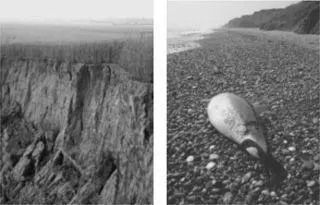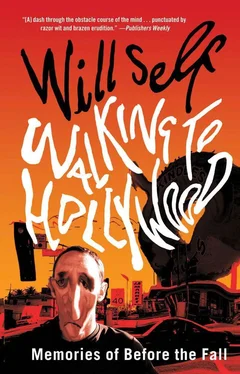Will Self - Walking to Hollywood
Здесь есть возможность читать онлайн «Will Self - Walking to Hollywood» весь текст электронной книги совершенно бесплатно (целиком полную версию без сокращений). В некоторых случаях можно слушать аудио, скачать через торрент в формате fb2 и присутствует краткое содержание. Год выпуска: 2011, Издательство: Grove/Atlantic, Inc., Жанр: Современная проза, на английском языке. Описание произведения, (предисловие) а так же отзывы посетителей доступны на портале библиотеки ЛибКат.
- Название:Walking to Hollywood
- Автор:
- Издательство:Grove/Atlantic, Inc.
- Жанр:
- Год:2011
- ISBN:нет данных
- Рейтинг книги:4 / 5. Голосов: 1
-
Избранное:Добавить в избранное
- Отзывы:
-
Ваша оценка:
- 80
- 1
- 2
- 3
- 4
- 5
Walking to Hollywood: краткое содержание, описание и аннотация
Предлагаем к чтению аннотацию, описание, краткое содержание или предисловие (зависит от того, что написал сам автор книги «Walking to Hollywood»). Если вы не нашли необходимую информацию о книге — напишите в комментариях, мы постараемся отыскать её.
Walking to Hollywood — читать онлайн бесплатно полную книгу (весь текст) целиком
Ниже представлен текст книги, разбитый по страницам. Система сохранения места последней прочитанной страницы, позволяет с удобством читать онлайн бесплатно книгу «Walking to Hollywood», без необходимости каждый раз заново искать на чём Вы остановились. Поставьте закладку, и сможете в любой момент перейти на страницу, на которой закончили чтение.
Интервал:
Закладка:
A golf course arrived, heralded by CCTV cameras and signs WARNING of crumpling cliff edges and flying golf balls. Next came a caravan park, with long lanes between the vans that followed the contour lines of the increasingly high and sheer cliff. It was past eight, and I greeted the dog walkers who were about, but they were having none of it. They stuck close to their metal hutches, while I was beyond the chain-link fence, hard by the cliff edge, a creature of sea and sky.
Then another park, the inhabitants of which were more rooted still, their static homes girded round with mini-picket fences, behind which sprouted potted gardens — wincey shrubberies and shocks of pampas grass. Aspen, Vogue, Celebration and Windsor all went by. Windsor had a nautical air, and the standard of St George stiffly riffled beside its jutting prow. A man stood watch outside its picture window, his feet spread on hardwood decking, his elbows propped on a taffrail. He looked like the bulldog on his tea mug, the same barrel chest, slope shoulders and bowlegs. His muzzle — red as the Holderness loess — was amiable enough, and so I hailed him, ‘Don’t you ever get worried?’
He raised a monobrow.
‘About the cliff?’
Was this perhaps a ridiculous solecism, as talk of carcinogens might be to a man riddled with cancer? For the neatly mown grass terminated a few paces from where we stood in a ragged tear that zigged towards one static home, then zagged away from its neighbour.
‘Me, wurried? No, lad,’ he laughed. ‘There’s a good forty-six feet there. It’s him oop there should wurry, he’s only got twelve and he isn’t even chained!’
I looked where he pointed and saw the unchained fool and the beckoning crevice.
‘See,’ the English bulldog resumed, ‘it goes pretty regular; true, I did lose nine feet last year, but that were exceptional.’
I shook my head, bedevilled by such sangfroid: ‘But look, with that crack coming in there, and this one over here, won’t it—’
‘Oh aye, it’ll even up — these hard standings’ll be gone before the year’s out’.
He nodded to the concrete platforms teetering over the abyss; they had the evil air of concentration camp ruins.
‘So,’ I said, ‘what happened to the static homes that were on them?’
‘Well, they joost move us back when we get too near— winch us oop, move us back. It’s all in the contract, like — part of the deal.’
Move us back, part of the deal. Death came wading through the sea fret; at first it was featureless, a blur of black robe and steel scythe, then it was right before me, elbows planted on the cliff edge the way any normally sized person might lean upon a bar. Death’s skull loomed, ivory in its house-sized hood, and it stretched out a bony grabber to wrench Aspen from its hard standing, then place it on a vacant square three rows back.
Glimpsed over my retreating shoulder, this looked to be a tender act, the merciful forestalling of these retirees’ inevitable decline, then fall. But it came at a cost, for Death completed this outsized chequers move by snatching up the two static homes it had taken and casting them into the sea. The cacophony — the pitiful screams, the smash and the clatter — stayed with me for a while, then they became the seagulls’ ordinary savagery, the mist drew back from the horizon, and there were no personifications to be seen except the turbines with their blades feathered, standing sentinel and still.
Stalks swarmed on the wide deck of a wheat field, then marched to the brink, where fluting away from their roots were buttresses and cornices of quick-setting mud. Away in their dense ranks the parentheses inscribed by last winter’s tractors referenced the remaining rags of mist, and so seemed like earthy vapour trails scored in a green-gold sky.
Ten yards of beach hauled themselves clear from the long fetch of the waves — I longed to descend, yet feared being trapped between cliff and sea. But then a dead porpoise swam into view, and as there was a way to scrabble down nearby I took it, then knelt on the shingle to contemplate its gouged flanks and parched spiracle. It was too silly to impute all evils to the turbines — no sea creature could have leapt into their blades — but the wounds seemed to have been made by a boatman’s gaff and there were few fishermen abroad on the water — although plenty of contractors.
I scrabbled back up and the cliff went on. The dead porpoise had shaken me and to steady myself I consulted my notebook, which suggested I try this mental exercise: On my holiday I took with me a neurofibrillary tangle that was awkward to manoeuvre — like a large bunch of twisted wire — and when I reached a gate or a stile I would have to wrangle it over, often tearing my clothing as the loose ends caught in the loops of my wicking T-shirt. Then there were the UPVC windows, three of them framed in white plastic, 140cm × 260cm, far too unwieldy for a walking tour. Not forgetting the parish records of Hornsea Burton, Hornsea Beck and Southorpe — the soggy ledgers from which leaves kept dropping, each veined with the calligraphy of birth, death and marriage; they were God-fearing parishes, these, yet all were sucked upon by the sea’s salty mouth, rod after rod, until they were dissolute. Finally, there was the rubber figurine, which, if meant as a child’s toy, was scarcely fit for purpose, being — despite its three-inch stature — a bulky, imposing thing, garbed in a skin-tight Churchillian siren suit, and, most disturbing of all, with a pig’s head, not a man’s.

The North Cliff Boat Club stood fifty feet above the waves, its yard a jumble of fibreglass hulls trapped behind corrugated iron and barbed wire. To escape into the sea the craft would have to be manhandled over the fence, then dragged down a steep concrete slipway — and what pleasure could there be in that?
The path drew me capriciously along a choked alley between two caravan parks, bindweed caught then snapped between my ankles, my clothes snagged at brambles and snatched up burrs, my bare arms lunged at nettles — then I found myself on the long dusty road into Hornsea, sweating in the noonday sun, as some obese people gathered round a cake stall beside the fire station waddled towards me and then past.
A street of redbrick two-up, two-downs, the deeply conservative impasto of road markings in yellow and white, the Floral Hall with ‘1911’ worked into its pediment — I had hoped, devoutly, for the respite of the town, the smell of car exhaust in the tarshadow of Nonconformist chapels, string shopping bags dangling along the high street. Instead, Hornsea Mere appeared between Belle-Époque yews, and, while I saw that model boats were abroad on its sweet waters, I knew that below them lay the Cainozoic mush of drowned woodlands and impacted reed beds, all the ebb and flow of millennia.
Along the high street there were no string shopping bags, only people yanking money from the cash points and running the next relay leg to the shops. I paused by the window of a secondhand one: 35mm cameras, some Spode. Inside tweed jackets clubbed together on hangars. As soon as the door tinged shut I hid behind a freestanding bookcase stuffed with paperbacks — but the tall, potbellied man who supervised the place hadn’t noticed me; he was involved with a peer in a corduroy cap. The pair were unwrapping a series of objects swathed in green recycling bags. The shopkeeper’s sleeves were rolled up almost to his armpits and his arms disturbed me.
I took a book from the case at random; it was Why Didn’t They Ask Evans? by Agatha Christie. The cover depicted a seagull nesting at the edge of a cliff; between its legs were a speckled egg and a golf ball. Down below, a man in a two-piece suit was plunging, tie flapping, and with more gulls bothering his blank face. The illustrator, working in pen and wash, had placed a nasty black outcrop in the waters, waters he had also embellished with the black swirls of an impact that was yet to occur .
Читать дальшеИнтервал:
Закладка:
Похожие книги на «Walking to Hollywood»
Представляем Вашему вниманию похожие книги на «Walking to Hollywood» списком для выбора. Мы отобрали схожую по названию и смыслу литературу в надежде предоставить читателям больше вариантов отыскать новые, интересные, ещё непрочитанные произведения.
Обсуждение, отзывы о книге «Walking to Hollywood» и просто собственные мнения читателей. Оставьте ваши комментарии, напишите, что Вы думаете о произведении, его смысле или главных героях. Укажите что конкретно понравилось, а что нет, и почему Вы так считаете.












